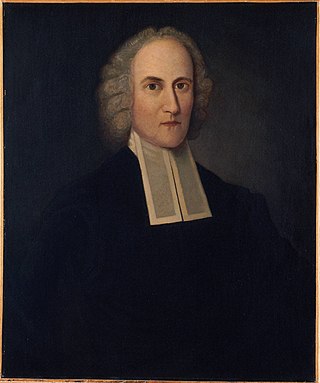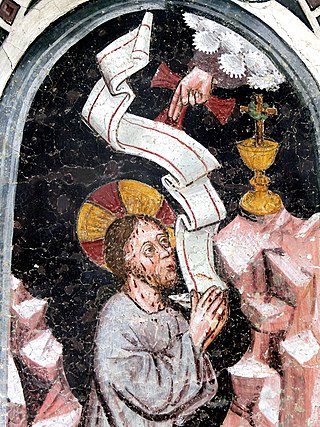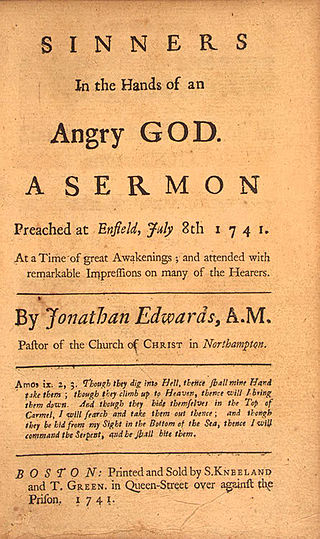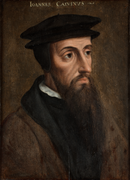Born again, or to experience the new birth, is a phrase, particularly in evangelicalism, that refers to a "spiritual rebirth", or a regeneration of the human spirit. In contrast to one's physical birth, being "born again" is distinctly and separately caused by the operation of the Holy Spirit, and it is not caused by baptism in water. It is a core doctrine of the denominations of the Anabaptist, Moravian, Methodist, Baptist, Plymouth Brethren and Pentecostal Churches along with all other evangelical Christian denominations. All of these Churches strongly believe Jesus's words in the Gospels: "You must be born again before you can see, or enter, the Kingdom of Heaven." Their doctrines also mandate that to be both "born again" and "saved", one must have a personal and intimate relationship with Jesus Christ.
Pentecostalism or classical Pentecostalism is a Protestant Charismatic Christian movement that emphasizes direct personal experience of God through baptism with the Holy Spirit. The term Pentecostal is derived from Pentecost, an event that commemorates the descent of the Holy Spirit upon the Apostles and other followers of Jesus Christ while they were in Jerusalem celebrating the Feast of Weeks, as described in the Acts of the Apostles.

Jonathan Edwards was an American revivalist preacher, philosopher, and Congregationalist theologian.

A spiritual gift or charism is an extraordinary power given by the Holy Spirit. These are believed by followers to be supernatural graces which individual Christians need to fulfill the mission of the Church. In the narrowest sense, it is a theological term for the extraordinary graces given to individual Christians for the good of others and is distinguished from the graces given for personal sanctification, such as the Seven Gifts of the Holy Spirit and the fruit of the Holy Spirit.

Perseverance of the saints is a Christian teaching that asserts that once a person is truly "born of God" or "regenerated" by the indwelling of the Holy Spirit, they will continue doing good works and believing in God until the end of their life.

Religious ecstasy is a type of altered state of consciousness characterized by greatly reduced external awareness and reportedly expanded interior mental and spiritual awareness, frequently accompanied by visions and emotional euphoria.

The Westminster Confession of Faith is a Reformed confession of faith. Drawn up by the 1646 Westminster Assembly as part of the Westminster Standards to be a confession of the Church of England, it became and remains the "subordinate standard" of doctrine in the Church of Scotland and has been influential within Presbyterian churches worldwide.
Sanctification literally means "to set apart for special use or purpose", that is, to make holy or sacred. Therefore, sanctification refers to the state or process of being set apart, i.e. "made holy", as a vessel, full of the Holy Spirit of God. The concept of sanctification is widespread among religions, including Judaism and especially Christianity. The term can be used to refer to objects which are set apart for special purposes, but the most common use within Christian theology is in reference to the change brought about by God in a believer, begun at the point of salvation and continuing throughout the life of the believer. Many forms of Christianity believe that this process will only be completed in Heaven, but some believe that complete holiness is possible in this life.
Ascetical theology is the organized study or presentation of spiritual teachings found in Christian Scripture and the Church Fathers that help the faithful to more perfectly follow Christ and attain to Christian perfection. Christian asceticism is commonly thought to imply self-denial for a spiritual purpose. The term ascetical theology is used primarily in Roman Catholic theology; Eastern Orthodox theology carries its own distinct terms and definitions, and other religious traditions conceive of following and conforming to God and Christ differently from either Orthodoxy or Catholicism.

The First Great Awakening or the Evangelical Revival was a series of Christian revivals that swept Britain and its thirteen North American colonies in the 1730s and 1740s. The revival movement permanently affected Protestantism as adherents strove to renew individual piety and religious devotion. The Great Awakening marked the emergence of Anglo-American evangelicalism as a trans-denominational movement within the Protestant churches. In the United States, the term Great Awakening is most often used, while in the United Kingdom the movement is referred to as the Evangelical Revival.
Christian perfection is the name given to theological concepts within some sects of Christianity that purport to describe a process of achieving spiritual maturity or perfection. The ultimate goal of this process is union with God characterized by pure love of God and other people as well as personal holiness or sanctification. Various terms have been used to describe the concept, such as entire sanctification, perfect love, the baptism with the Holy Spirit, the indwelling of the Holy Spirit, baptism by fire, the second blessing, and the second work of grace.

The seven gifts of the Holy Spirit are an enumeration of seven spiritual gifts first found in the book of Isaiah, and much commented upon by patristic authors. They are: wisdom, understanding, counsel, fortitude, knowledge, piety, and fear of the Lord.

The Fruit of the Holy Spirit is a biblical term that sums up nine attributes of a person or community living in accord with the Holy Spirit, according to chapter 5 of the Epistle to the Galatians: "But the fruit of the Spirit is love, joy, peace, patience, kindness, goodness, faithfulness, gentleness, and self-control." The fruit is contrasted with the works of the flesh which immediately precede it in this chapter.

The Summa Theologiae or Summa Theologica, often referred to simply as the Summa, is the best-known work of Thomas Aquinas (1225–1274), a scholastic theologian and Doctor of the Church. It is a compendium of all of the main theological teachings of the Catholic Church, intended to be an instructional guide for theology students, including seminarians and the literate laity. Presenting the reasoning for almost all points of Christian theology in the West, topics of the Summa follow the following cycle: God; Creation, Man; Man's purpose; Christ; the Sacraments; and back to God.
Heroic virtue is a phrase coined by Augustine of Hippo to describe the virtue of early Christian martyrs and used by the Catholic Church. The Greek pagan term hero described a person with possibly superhuman abilities and great goodness, and "it connotes a degree of bravery, fame, and distinction which places a man high above his fellows". The term was later applied to other highly virtuous persons who do extraordinary good works.
The Confession of Faith of the Evangelical United Brethren Church is one of five established Doctrinal Standards of the United Methodist Church, along with the Articles of Religion, the General Rules of United Societies, the Standard Sermons of John Wesley, and John Wesley's Explanatory Notes on the New Testament. The United Methodist Church adopted the Confession of Faith in 1968 when the Methodist Church merged with the Evangelical United Brethren Church to form the United Methodist Church. The Confession of Faith covers much of the same ground as the Articles of Religion, but it is shorter and the language is more contemporary. The Confession of Faith also contains an article on the Judgment and Future State which had not been present in the Methodist Articles of Religion.

A Faithful Narrative of the Surprising Work of God in the Conversion of Many Hundred Souls in Northampton is an essay written in 1737 by Jonathan Edwards about the process of Christian conversion in Northampton, Massachusetts during the Great Awakening, which emanated from Edwards' congregation in 1734.

New England theology designates a school of theology which grew up among the Congregationalists of New England, originating in the year 1732, when Jonathan Edwards began his constructive theological work, culminating a little before the American Civil War, declining afterwards, and rapidly disappearing after the year 1880.
A Dissertation Concerning the Nature of True Virtue is a work by American Christian reformer, theologian, author and, pastor Jonathan Edwards originally published posthumously in 1765. The work was published jointly with A Dissertation Concerning the End for Which God Created the World.

Sarah Edwards was an American missionary and the wife of theologian Jonathan Edwards. Her husband was initially drawn to her spiritual openness, direct relationship with God, and periods of spiritual ecstasy. As a theological student at Yale, he had longed to have a personal relationship with God. His wife's experiences, similar to those of Saint Teresa of Ávila, profoundly affected his religious life and the formation of the New Light. She was a model of spirituality during the Great Awakening of the early 18th century. Her experiences of religious ecstasy were documented in Jonathan Edwards's work, Some Thoughts Concerning the Present Revival of Religion in New England. She was a Puritan who took her faith very seriously. She raised her eleven children, largely by herself, as Jonathan Edwards focused on sermons and books. Among her noted descendants, Sarah was the grandmother of U.S. vice president Aaron Burr.











